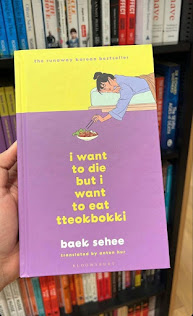The title "I Want To Die But I Want To Eat Tteokbokki" by Baek Sehee is a punch to the gut. It's blunt, provocative, and perfectly captures the complex inner struggle many of us face. But beneath that seemingly flippant title lies a profound and relatable exploration of depression, self-discovery, and the bittersweet beauty of life.
Sehee, our protagonist, might have a seemingly successful life, but a gnawing emptiness and a persistent feeling of "blah" plague her. The book unfolds as a series of therapy sessions between Sehee and her psychiatrist. Through these raw and honest dialogues, we witness Sehee confront anxieties, dissect self-deprecating thoughts, and navigate the pressures of modern life.
The title's brilliance lies in its metaphor. Tteokbokki, the beloved Korean street food of chewy rice cakes in a spicy sauce, represents the simple pleasures that retain a flicker of joy amidst the darkness. It's a reminder that even in the depths of despair, small moments of comfort and indulgence can exist.
Sehee's story resonates because it doesn't sugarcoat depression. It captures the cycle of self-doubt, the isolating feeling of being adrift, and the paralyzing fear of failure. It acknowledges the internal battles fought in silence, battles that many readers might recognize within themselves.
But "I Want To Die But I Want To Eat Tteokbokki" isn't just about the darkness. It's a testament to the human spirit's resilience. Through therapy, Sehee dismantles negative thought patterns. She learns to identify her strengths, rediscover her passions, and appreciate the beauty in everyday moments.
The book doesn't offer a magical cure for depression. Instead, it provides a sense of solidarity and a flicker of hope. By sharing Sehee's journey, Baek Sehee reminds us that we're not alone in our struggles. Many of us carry similar burdens, and seeking help is a sign of strength.
Here's what truly sets this book apart:
Raw Portrayal of Depression: Sehee's struggles feel authentic, allowing readers to connect with her vulnerability.
Destigmatizing Mental Health: Discussing therapy openly encourages readers to prioritize their well-being and seek professional help.
Finding Joy in the Simple: The book emphasizes that happiness doesn't require grand gestures, it can be found in everyday pleasures like savoring a favorite dish.
Humor and Vulnerability: Sehee's witty observations and self-deprecating humor provide moments of light-heartedness, proving that laughter can be a powerful coping mechanism even in difficult times.
The Power of Connection: Through therapy and interactions with loved ones, Sehee learns the importance of seeking support and building meaningful relationships.
"I Want To Die But I Want To Eat Tteokbokki" transcends being just a book. It's a conversation starter, encouraging open dialogue about mental health. It reminds us that it's okay to not be okay. It's a story about facing our demons, finding strength in vulnerability, and discovering the beauty of life, one spicy rice cake at a time.





No comments:
Post a Comment